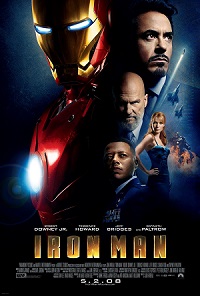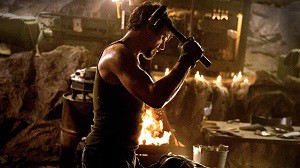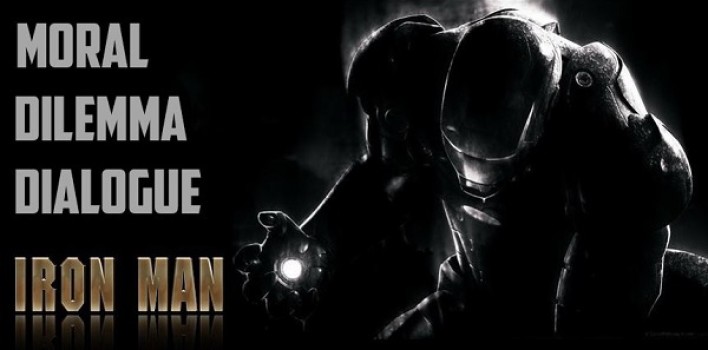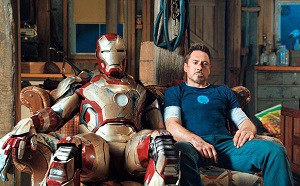Moral Dilemma Dialogue: Iron Man
In the Moral Dilemma Dialogue series we take one film and examine a moral dilemma presented within it. Two people take opposing sides of the dilemma and argue their case. The arguments are presented sight-unseen of the opposing side’s approach, and with no rebuttal. That is where you, the audience, come in.
The Dilemma
Is it more morally upright to create weapons, or to become one?
Background
 As the first entry to this new feature, it’s important we come out with a bang! Or in this case, a repulsor blast. Iron Man will be the subject of our scrutiny for this moral dilemma dialogue. Tony Stark made no bones about his peace-through-strength philosophy. No other scene sums it up quite so well than when he’s presenting the Jericho missile in the 2008 Marvel foundational film. He prefers, “the weapon you only have to fire once. That’s how Dad did it, that’s how America does it, and it’s worked out pretty well so far.” But when he discovers his weapons are being sold to and used by terrorist groups, his mentality on how to fight the enemy is shattered. Now, to escape his captors, he must become a weapon.
As the first entry to this new feature, it’s important we come out with a bang! Or in this case, a repulsor blast. Iron Man will be the subject of our scrutiny for this moral dilemma dialogue. Tony Stark made no bones about his peace-through-strength philosophy. No other scene sums it up quite so well than when he’s presenting the Jericho missile in the 2008 Marvel foundational film. He prefers, “the weapon you only have to fire once. That’s how Dad did it, that’s how America does it, and it’s worked out pretty well so far.” But when he discovers his weapons are being sold to and used by terrorist groups, his mentality on how to fight the enemy is shattered. Now, to escape his captors, he must become a weapon.
The goal with this dialogue is to get a healthy conversation going around this dilemma. Presenting two sides to the argument today are Mark Wingerter and Gene Gosewehr. Mark will present a humanistic perspective to the problem, while Gene will give a Christian response to it. While they are both presenting their argument from certain perspectives, they are doing so to get a conversation going. They each may actually hold different opinions in real life. We welcome your critique, questions, and of course your own perspective as well!
Perspective One: Mark, Humanistic argument for becoming a weapon
Imagine you’re back in the 17th century on one of those big sailing ships that marked the era. You’re stranded at sea, the main mast has broken in a storm and there’s nothing you can do without aid. To make matters worse, you’ve heard reports there are pirates coming your way, fire in their gut, armed to the teeth and ready to kill. You’ve got your own formidable cannons and you’re faced with a choice- fight or die.
 Tony Stark finds himself in a similar situation during the first half of Iron Man. The men who captured him are forcing him to make a weapon for them. But Tony chooses to to fight rather than face certain death and let a powerful weapon get into the wrong hands. While there are arguably many ways he could fight rather than take up arms, the most likely option that leads to survival is to shoot. If he were stranded on that 17th century boat, he’d have been itching to fire those cannons.
Tony Stark finds himself in a similar situation during the first half of Iron Man. The men who captured him are forcing him to make a weapon for them. But Tony chooses to to fight rather than face certain death and let a powerful weapon get into the wrong hands. While there are arguably many ways he could fight rather than take up arms, the most likely option that leads to survival is to shoot. If he were stranded on that 17th century boat, he’d have been itching to fire those cannons.
It’s easy to say our world would be better without guns, but before guns there were swords, and before swords there were stones. If we accept that weapons will be fashioned, then we must accept that we have a moral obligation to police those weapons. In order to do that, someone must have a force great enough to stand against the weapon and create order. Thus, as in Iron Man, we must have men with iron character to wield the weapons.
But what if the man could be the weapon? That’s an alternative that our current world cannot quite realize through technology. Yet if it did, this would be a more moral scenario, as other men would have less ability to control a man than to control a gun. Certainly it’s possible to control a man, but it’s undoubtedly more difficult.
Ayn Rand said that “morality ends where a gun begins.” But if guns are an inevitability, then where does morality begin again? If we say that it begins when we lay down the gun, then it must be concluded that the immoral could destroy the moral, because this debate boils down to the “right hands” versus the “wrong hands.” Somebody is going to take up arms, and if we have the choice to be the weapon ourselves, burst out into the sky from that big boat on the sea and fight off the pirates coming our way, then whether we want that to be the way it has to be or not, we have to say it is the more moral option.
So who has the right hands? It may be impossible to truly say, but we can make the choice to equip someone with the best display of moral character we can determine. Here’s the thing, though. You can actually become a weapon. Sure, Iron Man technology isn’t available in reality, but we can still be a weapon. As mentioned, there are many ways to fight, and they might lead to certain death. But it’s the more moral choice for the person with the right hands to fight back, regardless of the means. They must equip themselves and society must help them realize that choice. It proves that whatever your weapon, it is the more moral choice to become one rather than make them and ignore who might get control of it.
Perspective Two: Gene, Christian argument for creating and using weapons
Breaking down the differences in our two positions here will require a bit of nuance. Neither of us are holding a strictly pacifist mentality. I acknowledge there are Christian arguments for varying degrees of pacifism, but we are operating within the bounds of an appropriate use of force and the methods by which that force is applied. Given that, I believe the Christian answer and the morally correct choice in this matter would be to create and oversee the use of weapons, not to become one yourself.
 Foundational in the Christian worldview is that mankind are sinners. We have all sinned, we all seek after our own desires and our hearts are constantly inclined to wicked deeds (Rom. 3:23, Gen. 6:5). Tony Stark embodies this view as well as any. He is reckless, selfish, a drunkard, and careless not only with his life but with what he creates. In fact, it is this carelessness which leads to the corruption of the weapons he created. They fell into the wrong hands because he was not watchful over them and he invested his trust in an untrustworthy person. His choice to stop making weapons and become one himself is ultimately a selfish decision. Not only is he denying others some degree of self-defense by withholding his creations, but worse off he believes that he cannot be corrupted in this way and use the weapon (himself) wrongly. He believes he is impervious to such manipulation. He’ll always choose rightly. He’s always correct. It’s a misguided and flawed view of himself that ultimately comes back to haunt him and it is not a view of mankind that we should be endorsing.
Foundational in the Christian worldview is that mankind are sinners. We have all sinned, we all seek after our own desires and our hearts are constantly inclined to wicked deeds (Rom. 3:23, Gen. 6:5). Tony Stark embodies this view as well as any. He is reckless, selfish, a drunkard, and careless not only with his life but with what he creates. In fact, it is this carelessness which leads to the corruption of the weapons he created. They fell into the wrong hands because he was not watchful over them and he invested his trust in an untrustworthy person. His choice to stop making weapons and become one himself is ultimately a selfish decision. Not only is he denying others some degree of self-defense by withholding his creations, but worse off he believes that he cannot be corrupted in this way and use the weapon (himself) wrongly. He believes he is impervious to such manipulation. He’ll always choose rightly. He’s always correct. It’s a misguided and flawed view of himself that ultimately comes back to haunt him and it is not a view of mankind that we should be endorsing.
Please don’t misunderstand me. I am not saying that a system in which people are the creators and users of weapons is fool-proof. What I’m saying is that a system in which one or a few people become the weapon themselves is far more likely to fall into chaos or corruption than one in which people are using weapons and providing checks against each other to do so. Making yourself the weapon and putting yourself to use only when you see fit removes opportunity for counsel and wisdom from others (Prov. 1:5, Prov. 11:14, Prov. 19:20). It relies completely on the moral fortitude and righteousness of a single person. A person can be wrong many times. A person’s decisions are influenced by their biases and preferences. Groups of people can counterbalance such bias and reach better conclusions than one person on their own.
The Israelites were given a simple system of a multitude of judges to govern over them, yet they demanded a single king just like the nations around them (1 Sam. 8:5-7). From that they had a few good years, but largely they received tyranny and oppression. The apostles instructed the church to have a group of elders to lead them (Acts, 14:23, Titus 1:5), not a single human leader over them all. In times when crucial decision-making and leadership were needed, God called for multiplicity of leaders. If we hold that becoming a weapon ourselves is morally preferable to merely being the creators and users of weapons, then we’re placing our trust in the values and morality of one person rather than that of many.
Conclusion
This is where the true dialogue part of this post comes in. Where do you fall on this dilemma? Is Mark making a good humanistic case for becoming a weapon? Is Gene accurately representing a good Christian case for maintaining the creation and use of weapons without becoming one? If you side with one or the other, please vote in our poll below. But maybe you would take a different approach all-together. No matter your view, we want to hear your thoughts about this dilemma in the comments below.








